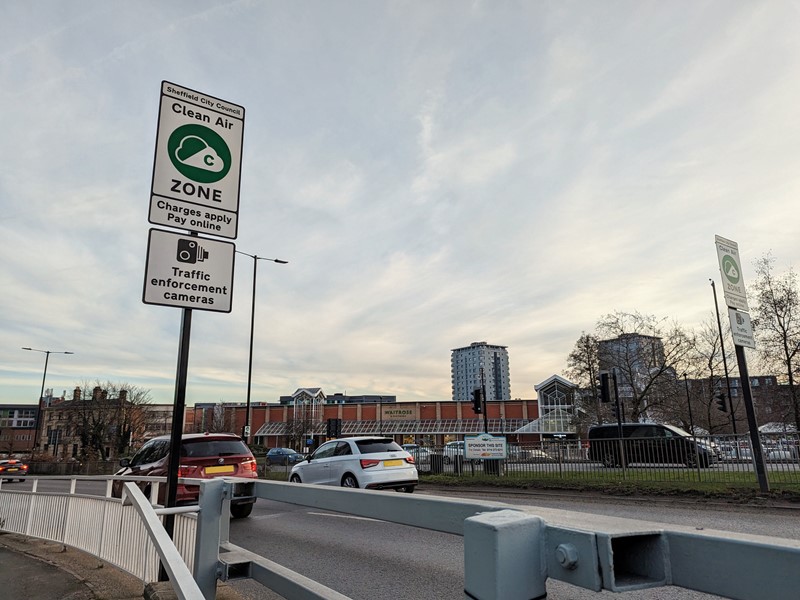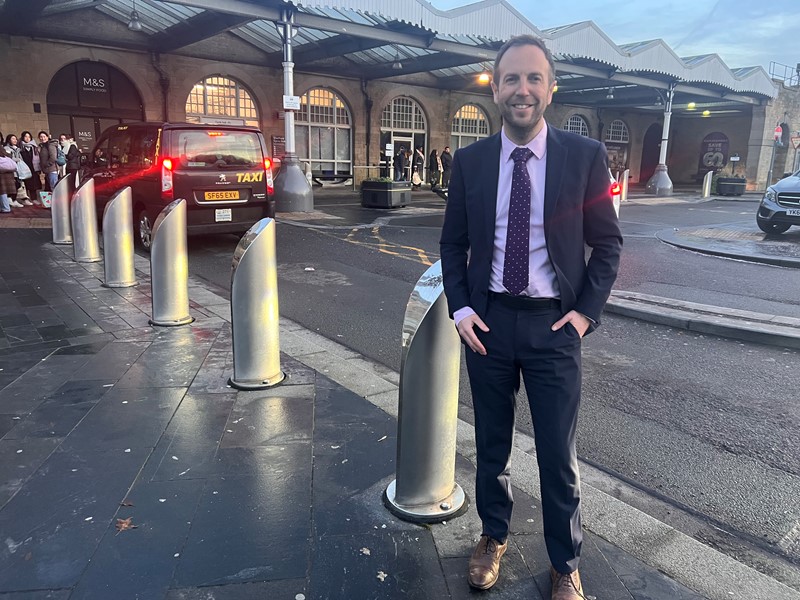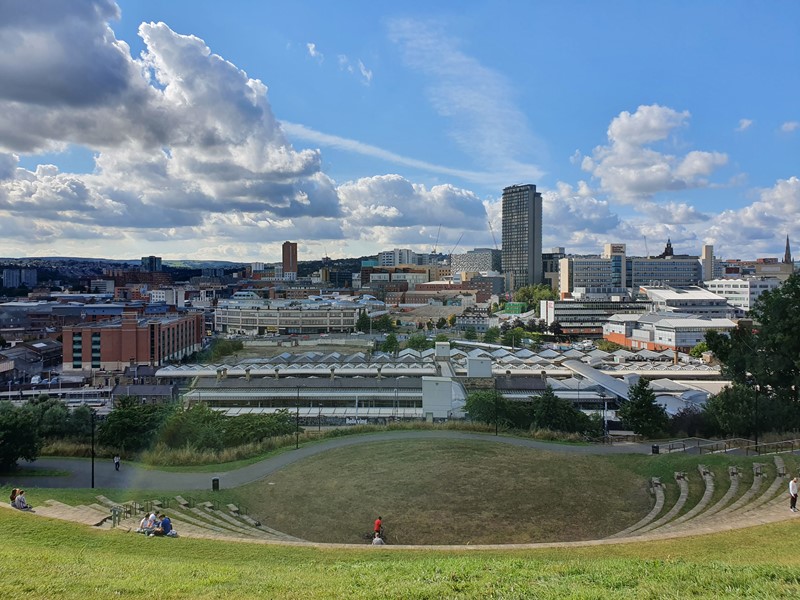Over a year on from the launch of Sheffield City Council’s Clean Air Zone, annual average data for 2023 shows that the level of nitrogen dioxide (NO2) from road traffic pollution has fallen significantly across Sheffield.
Air quality improvements across Sheffield mean better health outcomes for local people
Greg Fell, Director of Public Health at Sheffield City Council said: "Following the Clean Air Zone’s (CAZ) one-year anniversary in February, we are now able to take an early look at the impact the CAZ is having on the quality of the air we breathe in Sheffield, and the news is very positive. Our 12-month annual average data for 2023 is showing that the level of Nitrogen Dioxide (NO2) in Sheffield, caused by road pollution, has significantly improved, which is great news for the health of everyone in Sheffield.
"In my previous article back in February (1), I wrote about the positive impact we had already begun to see since the introduction of the CAZ the year before; the number of polluting vehicles within the CAZ boundary had dropped by two thirds, or 64 per cent to be precise, and the polluting traffic around the boundary had also dropped by 18 per cent – suggesting that more and more people are making the switch to cleaner vehicles.
"As of May 2024, 91 per cent of the vehicle journeys through the CAZ are compliant to CAZ requirements, compared to 64 per cent in November 2022; and our local taxi service is 95 per cent compliant, compared to 64 per cent in November 2022. Whilst we are still awaiting the fully ratified data from government, which we expect to see in coming weeks, this early look at NO2 and vehicle trends is extremely positive, it shows us the CAZ is working.
"We know that dirty air affects every single one of us in some way (2), but some people are more at risk, especially children, older people and those who already have health problems. Pregnant women are also at risk because pollution can harm their unborn babies and children growing up in areas with high pollution are more likely to have more health problems, impacting their growth and education.
"Air pollution is harmful to our health in many ways and can lead to life changing diseases such as lung cancer, stroke, and asthma (3). Our brains can also suffer, with studies showing that breathing polluted air might make it harder to think clearly and could lead to problems as we get older, such as being more likely to develop dementia (4).
"Whilst our first look at the annual average data is very positive, this is no time to slow down on clean air initiatives or begin thinking about winding down the CAZ. We know that there are still five locations across Sheffield that are still in exceedance of legal air quality limits, so there’s more to be done to improve the air we breathe. The council is working to monitor areas in exceedance to provide a tailored approach to improve air quality in those locations as quickly as possible.
"But despite the need for us to do more to improve air quality in these areas, there has still been an overall decrease in air pollution which means they’re now places that are healthier than they were before – if not yet healthy enough - for the people who live, work, study and play there.
"Legal limits for air pollution are set by the Government. However, these limits are not as strict as guidelines suggested by health experts like the World Health Organisation (WHO). Scientific research is discovering that even if the air pollution levels are within the legal limits they are still harmful to our health, especially for children, older people, and people who have health problems. This means that while the air might be considered "safe" by law, it is still causing problems like asthma, heart disease, and other illnesses.
"For example, the WHO recommends that tiny particles in the air that affect our health (called particulate matter or PM2.5). should not be higher than 5 micrograms per cubic meter on average each year, but many countries allow higher amounts. In England, the Government has set a target to reach 10 micrograms per cubic meter by 2040, however the legal limit is twice as high than WHO-recommended limits. These tiny particles have been linked to all the same health problems described above (5).
"To make the air healthier for everyone, it's important we keep working towards lowering pollution levels, closer to what health experts recommend. This means it's important for all of us to work together to reduce pollution to make the air safer for everyone to breathe. The neighbourhoods we live in should be places that support us to be healthy and well, as well as being nice places to live.
"Alongside the CAZ, there’s plenty more going on across the council to improve air quality and the health of our residents.
"We’ve recently introduced four Sheffield Connect electric buses into the city centre, the service is free, and not only makes the city centre more accessible for everyone, but it provides residents and visitors with a quick, easy and zero emission way to travel.
"There’s more to be done to upgrade Sheffield bus fleet to become cleaner and greener, and the council is already working with local bus operators, the South Yorkshire Mayoral Combined Authority and Government to progress ambitions for a zero-emission bus fleet across the region.
"We are also improving the existing network of electric vehicle charging points, making it easier and more convenient for people to make the switch from polluting vehicles to electric.
"Elsewhere, we are working to improve transport infrastructure to enable people to make healthier travel choices, reduce their reliance on cars for short trips, and support people to be more active in their everyday lives by walking, wheeling or cycling or by catching a bus. We all know that being more physically active – for example by walking more – is great for our health and wellbeing. Fewer of us realise that it also benefits Sheffield’s economy.
"The evidence shows that good quality paths for walking, wheeling and cycling can make neighbourhoods nicer, and shops and businesses do better when more people walk or bike nearby because they’re more likely to stop and shop than someone in a car (6).
"Walking and cycling are also good for the environment because they don’t cause pollution, meaning better places to live for us and our urban wildlife, whilst helping us tackle other big issues like climate change. For people who aren’t able to do their journey by walking, wheeling, cycling or on a bus, there will be fewer cars on the road meaning less time wasted in traffic jams. All these benefits make Sheffield a better place to live and work, attracting more people and businesses.
"The Clean Air Zone is just part of the work we’re doing to transform our city centre into a healthier, greener, and cleaner place for everyone to be. Through our Local Plan and city centre regeneration we are creating a thriving, liveable and sustainable city fit for the future."
References
- Sheff News article: A year on living with the Clean Air Zone: https://sheffnews.com/news/a-year-on-living-with-the-clean-air-zone
- Sheff News Article: ‘There is no safe limit’ https://sheffnews.com/news/public-health-leads-warn-no-air-pollution-limit-is-a-safe-limit
- Royal College of Physicians & Royal College of Paediatrics and Child Health. Every breath we take: 2016: https://www.rcplondon.ac.uk/projects/outputs/every-breath-we-take-lifelong-impact-air-pollution
- Chief Medical Officer’s Annual Report 2022 (publishing.service.gov.uk)]
- The updated WHO air quality guidelines are a big step forward but not a complete solution | The BMJ]
- Walking and cycling: the economic benefits (tfl.gov.uk)



